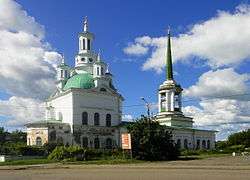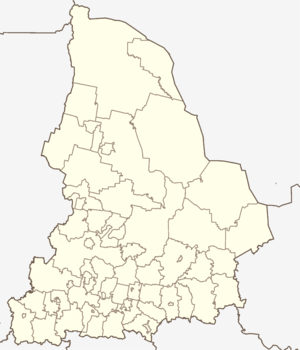Alapayevsk
| Alapayevsk (English) Алапаевск (Russian) | |
|---|---|
| - Town[1] - | |
 Holy Trinity Cathedral, July 2014 | |
.svg.png) Location of Sverdlovsk Oblast in Russia | |
 Alapayevsk | |
|
| |
 | |
|
| |
| Administrative status (as of 2011) | |
| Country | Russia |
| Federal subject | Sverdlovsk Oblast[1] |
| Administratively subordinated to | Town of Alapayevsk[1] |
| Administrative center of | Town of Alapayevsk |
| Municipal status (as of June 2009) | |
| Urban okrug | Alapayevsk Urban Okrug[2] |
| Administrative center of | Alapayevsk Urban Okrug |
| Statistics | |
| Area | 25 km2 (9.7 sq mi) |
| Population (2010 Census) | 38,192 inhabitants[3] |
| Density | 1,528/km2 (3,960/sq mi)[4] |
| Time zone | YEKT (UTC+05:00)[5] |
| First Mentioned | 1639 |
| Town status since | 1781 |
| Postal code(s)[6] | 624600 — 624619 |
| Dialing code(s) | +7 34346 |
| Alapayevsk on Wikimedia Commons | |
Alapayevsk (Russian: Алапа́евск) is a town in Sverdlovsk Oblast, Russia, located at the confluence of the Neyva and Alapaikha Rivers. Population: 38,192 (2010 Census);[3] 44,263 (2002 Census);[7] 50,060 (1989 Census);[8] 49,000 (1968).
History
Alapayevsk is one of the oldest centers of ferrous metallurgy in the Urals with the first factory built in 1704. The town proper was founded in 1781.
Murder of Russian Imperial family members
On July 18, 1918, the day after the shooting at Yekaterinburg of the last Tsar, Nicholas II and family, members of the extended Russian royal family, the Romanovs, including a nun and servants met a brutal death here being thrown down a mineshaft near Alapayevsk by Bolsheviks. All except Grand Duke Sergey Mikhaylovich (who was the first one to die; he was shot before they could throw him in) survived the fall, hand-grenades were thrown down after them killing Grand Duke Sergey's secretary, Fyodor Remez. Other victims died a slow death including the Prince Ioann Konstantinovich of Russia, Prince Konstantin Konstantinovich of Russia, Prince Igor Konstantinovich of Russia and Prince Vladimir Pavlovich Paley, Grand Duke Sergei's secretary Varvara Yakovleva and Grand Duchess Elizabeth Fyodorovna (born Princess Elisabeth of Hesse and by Rhine), a granddaughter of Queen Victoria. Princess Elisabeth had departed her family after the death of her husband in 1905, and although she donated all her wealth to the poor and became a nun, she was shown no mercy.[9]
The bodies were recovered from the mine by the White Army in 1918, who arrived too late to rescue them. The bodies were placed in coffins and were moved around Russia during struggles between the Whites and the opposing Red Army. Princess Elisabeth's remains were ultimately taken to Jerusalem, where they were laid to rest in the Church of Maria Magdalene, while the coffins of the others were interred in a former Russian Mission in Beijing, now beneath a parking area. In 1981, Princess Elisabeth was canonized by the Russian Orthodox Church Outside Russia, and in 1992 by the Moscow Patriarchate. In 2006 representatives of the Romanov family were making plans to reinter the remains elsewhere.[10] The town is a place of pilgrimage to the memory of Elizabeth Romanov.[11]
Administrative and municipal status
Within the framework of the administrative divisions, it is, together with nine rural localities, incorporated as the Town of Alapayevsk[1]—an administrative unit with the status equal to that of the districts.[12] As a municipal division, the Town of Alapayevsk is incorporated as Alapayevsk Urban Okrug.[2]
Transportation
The Alapayevsk narrow-gauge railway serves the communities around Alapayevsk
Miscellaneous
Local orphanage (Alapaevsk Family-Type Orphanage) proclaims itself as the largest in the Urals.[13]
Notable people
The composer Pyotr Ilyich Tchaikovsky spent a part of his childhood in Alapayevsk.
References
Notes
- 1 2 3 4 Государственный комитет Российской Федерации по статистике. Комитет Российской Федерации по стандартизации, метрологии и сертификации. №ОК 019-95 1 января 1997 г. «Общероссийский классификатор объектов административно-территориального деления. Код 65 403», в ред. изменения №259/2014 от 12 декабря 2014 г.. (State Statistics Committee of the Russian Federation. Committee of the Russian Federation on Standardization, Metrology, and Certification. #OK 019-95 January 1, 1997 Russian Classification of Objects of Administrative Division . Code 65 403, as amended by the Amendment #259/2014 of December 12, 2014. ).
- 1 2 Law #85-OZ
- 1 2 Russian Federal State Statistics Service (2011). "Всероссийская перепись населения 2010 года. Том 1" [2010 All-Russian Population Census, vol. 1]. Всероссийская перепись населения 2010 года (2010 All-Russia Population Census) (in Russian). Federal State Statistics Service. Retrieved June 29, 2012.
- ↑ The value of density was calculated automatically by dividing the 2010 Census population by the area specified in the infobox. Please note that this value may not be accurate as the area specified in the infobox does not necessarily correspond to the area of the entity proper or is reported for the same year as the population.
- ↑ Правительство Российской Федерации. Федеральный закон №107-ФЗ от 3 июня 2011 г. «Об исчислении времени», в ред. Федерального закона №271-ФЗ от 03 июля 2016 г. «О внесении изменений в Федеральный закон "Об исчислении времени"». Вступил в силу по истечении шестидесяти дней после дня официального опубликования (6 августа 2011 г.). Опубликован: "Российская газета", №120, 6 июня 2011 г. (Government of the Russian Federation. Federal Law #107-FZ of June 31, 2011 On Calculating Time, as amended by the Federal Law #271-FZ of July 03, 2016 On Amending Federal Law "On Calculating Time". Effective as of after sixty days following the day of the official publication.).
- ↑ Народная энциклопедия «Мой Город»
- ↑ Russian Federal State Statistics Service (May 21, 2004). "Численность населения России, субъектов Российской Федерации в составе федеральных округов, районов, городских поселений, сельских населённых пунктов – районных центров и сельских населённых пунктов с населением 3 тысячи и более человек" [Population of Russia, Its Federal Districts, Federal Subjects, Districts, Urban Localities, Rural Localities—Administrative Centers, and Rural Localities with Population of Over 3,000] (XLS). Всероссийская перепись населения 2002 года [All-Russia Population Census of 2002] (in Russian). Retrieved August 9, 2014.
- ↑ Demoscope Weekly (1989). "Всесоюзная перепись населения 1989 г. Численность наличного населения союзных и автономных республик, автономных областей и округов, краёв, областей, районов, городских поселений и сёл-райцентров" [All Union Population Census of 1989: Present Population of Union and Autonomous Republics, Autonomous Oblasts and Okrugs, Krais, Oblasts, Districts, Urban Settlements, and Villages Serving as District Administrative Centers]. Всесоюзная перепись населения 1989 года [All-Union Population Census of 1989] (in Russian). Институт демографии Национального исследовательского университета: Высшая школа экономики [Institute of Demography at the National Research University: Higher School of Economics]. Retrieved August 9, 2014.
- ↑ Time Magazine, Books: Death at Ekaterinburg, Monday, Apr. 22, 1935
- ↑ Orthodox News China
- ↑ Life Orphomed Russia
- ↑ Law #30-OZ
- ↑
Sources
- Областная Дума Законодательного Собрания Свердловской области. Областной закон №30-ОЗ от 20 мая 1997 г. «Об административно-территориальном устройстве Свердловской области», в ред. Закона №32-ОЗ от 25 апреля 2012 г. «О внесении изменений в Областной закон "Об административно-территориальном устройстве Свердловской области"». Вступил в силу со дня официального опубликования за исключением отдельных положений, вступающих в силу в иные сроки. Опубликован: "Областная газета", №81, 3 июня 1997 г. (Oblast Duma of the Legislative Assembly of Sverdlovsk Oblast. Oblast Law #30-OZ of May 20, 1997 On the Administrative-Territorial Structure of Sverdlovsk Oblast, as amended by the Law #32-OZ of April 25, 2012 On Amending the Oblast Law "On the Administrative-Territorial Structure of Sverdlovsk Oblast". Effective as of the day of the official publication with the exception of several clauses which take effect on a different date.).
- Областная Дума Законодательного Собрания Свердловской области. Закон №85-ОЗ от 12 июля 2007 г. «О границах муниципальных образований, расположенных на территории Свердловской области», в ред. Закона №107-ОЗ от 29 октября 2013 г. «Об упразднении отдельных населённых пунктов, расположенных на территории города Ивделя, и о внесении изменений в Приложение 39 к Закону Свердловской области "О границах муниципальных образований, расположенных на территории Свердловской области"». Вступил в силу через 10 дней после официального опубликования. Опубликован: "Областная газета", №232–249, 17 июля 2007 г. (Oblast Duma of the Legislative Assembly of Sverdlovsk Oblast. Law #85-OZ of July 12, 2007 On the Borders of the Municipal Formations on the Territory of Sverdlovsk Oblast, as amended by the Law #107-OZ of October 29, 2013 On Abolishing Several Inhabited Localities on the Territory of the Town of Ivdul and on Amending the Law of Sverdlovsk Oblast "On the Borders of the Municipal Formations on the Territory of Sverdlovsk Oblast". Effective as of the day which is 10 days after the official publication.).